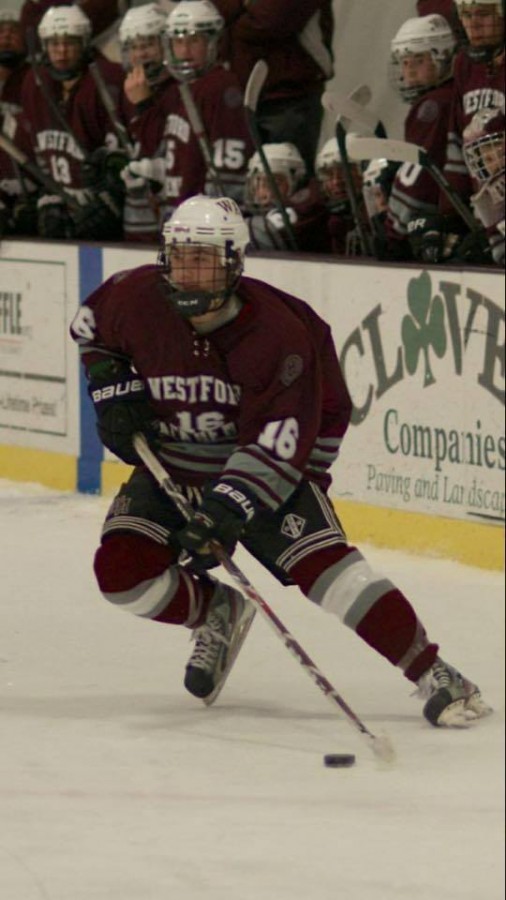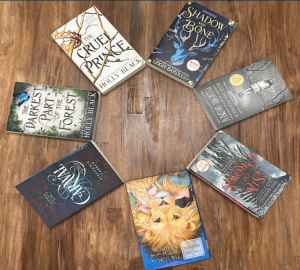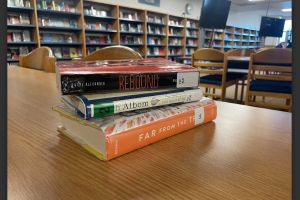Gulliver shares his tragic concussion story
January 25, 2016
Concussions are one of the few invisible physical injuries that an athlete can have. However, the effects and overall impact of concussions is not lost on one former WA boys’ hockey player, who will now never be able to play hockey, or any other sports for the remainder of his still young life.
Anthony Gulliver, a senior at Westford Academy, was playing hockey for the boys’ team on February 4th, 2015. The team was playing Billerica in a regular season matchup at Skate Three. Little did he know that it would be his final time ever stepping foot on the ice in a WA uniform.
Gulliver was handling the puck in the corner, when Billerica’s captain hit him in the head into the glass. Angry with the cheap shot, Gulliver stood up and punched him. Gulliver was then punched in the head by the Billerica captain in retaliation. With all these events occurring at the end of a period, Gulliver describes his feelings as he entered the locker room for intermission.
“We got off, I went to the locker room and sat down. I was feeling really dizzy […]. Coach Carpenter had Billy [Bombaci, WA athletic trainer] come in and talk to me. I went into the bathroom and threw up,” said Gulliver.
Gulliver was then kept off the ice in order to perform concussion tests with Bombaci. After the evaluation, Gulliver was sent home and was recommended a doctor to see the next day to further evaluate the issues.
Gulliver went to Children’s Hospital in Boston to be looked at more extensively. He was told by doctors that he had a major concussion, setting off a very difficult time in Gulliver’s life.
After scoring less than a zero on the WA concussion impact test, Gulliver was also told that his retina would be disconnected if he were to receive another concussion. This led him, his mother, and doctors to decide that it would be best for him not to play hockey, or any other sports for that matter.
“It didn’t really hit me until a few weeks after […] and I wouldn’t say I got depressed, but I was really upset,” said Gulliver.
Gulliver’s coach Bob Carpenter had some high praise for his former player when it came to his play, and elaborated on how the team reacted to the concussions.
“Anthony loves hockey and is an exceptional player. When he suffered through the concussion and the after effects it was very difficult and very emotional for him and for all of us. The way he accepted the decision and how he handled himself after was incredible. He is a very special person and this year has been a valued addition to our coaching staff,” said Carpenter.
Carpenter, who is close with Gulliver, took him to Colby College to meet a hockey coach who had the same tragedy happen to him in high school. Gulliver still keeps this connection with the coach nowadays.
“I still text him to this day,” said Gulliver.
However, the effects are still not completely gone, as Gulliver still finds that he has trouble in school after missing four months. He was given term three of 2015 off due to his prolonged absence as part of WA’s concussion academic accommodations.
Currently, Gulliver is helping coach the boys’ team during this season, and he enjoys being around the game as much as he can despite his injury.
When it comes to concussions as a whole, Gulliver has a few words of advice for athletes who suspect they have a concussion.
“I would just say that if you do think you have one, report it because if you don’t report one and you have a bad one and you have trouble in school, you don’t have anything to back you up. And if you need help, there’s plenty of people who can help you,” said Gulliver.
Gulliver also believes that both WA and the rules within MIAA hockey make ahead injuries a point of emphasis and he believe it keeps players healthy and safe within the game.
While, Gulliver does wish that he would have not put himself in the situation to be punched following the hit, he does have powerful words about his final season in hockey for the rest of his life that single handily show the heavy impact a concussion can have on a player.
“I don’t remember the last year of my life […] everyday I got on the ice, [I think that] knowing that it could be my last time skating would change how I played,” said Gulliver.







